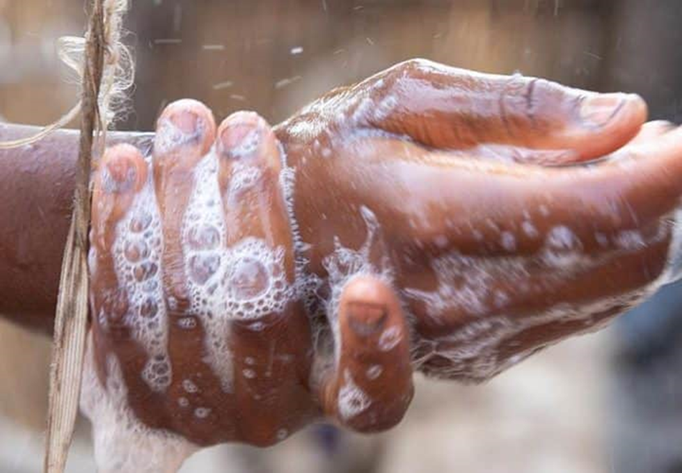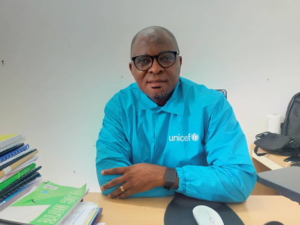Handwashing : A Vital Gesture for Human Health

October 15, World Handwashing Day, is an important opportunity to remind everyone of the importance of this simple but crucial gesture for human health. Unfortunately, in some neighborhoods like Abattoir or Messassi, in the city of Yaoundé, this gesture is often neglected, although it can save lives.
At the Olembe district hospital, the equipment used to celebrate World Handwashing Day is still in place, but visitors seem to be unaware of its existence. Some points of handwashing are installed in every corner of the hospital, but nobody uses them. Some don’t even know that this day exists. “I didn’t know there was a special day for handwashing. I wash my hands all the time when they get dirty, for example when I come out of the toilet or when I want to eat,” says a hospital guard.
On the other hand, some restaurants like Abdoul Karim’s in the Abattoir neighborhood provide water and soap for customers to wash their hands. “It’s a tradition for us from the north. We eat with our hands and it’s imperative to wash our hands before eating. Moreover, we pray five times a day and before each prayer, we have to wash our hands,” explains Abdoul Karim. “If they didn’t have this culture, they probably wouldn’t wash their hands every time,” says a neighbor sitting nearby.
The lack of interest in handwashing can have serious consequences, such as the spread of diseases like cholera, dirty hand diseases, and others. UNICEF emphasizes that handwashing awareness should not be limited to October 15, but should be a daily fight. Getting into the habit of handwashing can be an effective way to combat diseases caused by dirt.
In 2020, handwashing played a crucial role in the fight against COVID-19, a deadly virus that caused hundreds of thousands of deaths worldwide. This shows just how much our hands can save our lives. It is therefore urgent to join the rest of the world in highlighting the importance of handwashing.
World Handwashing Day was initiated by UNICEF to reduce the infant mortality rate caused by diarrheal diseases. However, in our cities, we face a lack of water, which makes it difficult to put this vital gesture into practice. It is therefore important to emphasize the availability of water in our cities so that handwashing can become a daily habit.
Handwashing is a simple but crucial gesture for human health. It is essential to remember that this gesture can save lives and practice it regularly. It is also important to raise awareness about the importance of handwashing and make water available in our cities so that handwashing can become a daily habit.
Mohaman BELLO
“Handwashing can prevent 30% of waterborne diseases and many others such as dysentery and cholera carried by dirty hands.”
Idriss Kouotou N., WASH Specialist, UNICEF Cameroon

Can you enlighten us on the impact of handwashing on public health in Cameroon and on the role of UNICEF in promoting this essential practice?
The impact of handwashing is undeniable! It’s an essential personal hygiene measure, comparable to an “individual and social vaccine”. As long as we don’t wash our hands properly, we remain vulnerable to many infectious diseases. In fact, it’s established that 80% of infectious diseases are transmitted through hand contact. Regular handwashing not only protects our own health but also that of our loved ones. By touching everyday objects like door handles, we can contaminate others and contribute to the spread of infectious diseases.
In Cameroon, as elsewhere in the world, epidemics like cholera and mpox highlight the crucial importance of hand hygiene. These diseases are easily transmitted through contact with contaminated fecal matter, and hands play a key role in this transmission chain. Handwashing is a simple but effective way to preserve our health and that of our community. It’s therefore essential to raise awareness among the entire population about the importance of this practice.
What role does UNICEF play in this approach?
The role that UNICEF plays here is very important because its primary target is children, who are the most vulnerable. You agree with me that when diarrheal diseases attack children, it’s almost the entire society that is affected: the mother can’t go to work, the father is also unstable, and the child’s education is compromised. Therefore, UNICEF feels strongly called upon to ensure that children have a healthy environment.
Why is it important to celebrate World Handwashing Day?
It’s very important to celebrate World Handwashing Day to remind people of this fundamental practice that often escapes us. We need to maintain awareness and involve everyone: children, parents, healthcare professionals, etc. You, as media professionals, can easily impact the population through interviews, programs, and awareness-raising activities. The same applies to civil society. This mission is not only the responsibility of UNICEF.
What initiatives has UNICEF taken to promote handwashing in Cameroon?
The recent celebration of World Handwashing Day was an opportunity to take concrete actions on the ground. For example, in the Adamaoua region, nearly six thousand children participated in practical workshops, learning the five essential steps of handwashing: wetting, soaping, rubbing, rinsing, and drying. At UNICEF, we are convinced that these children have acquired the necessary reflexes to adopt rigorous hygiene habits in their daily lives.
These initiatives have been replicated in many schools, thanks to UNICEF’s support. Beyond awareness campaigns, we have taken concrete actions to address the needs of the population. By asking people about the obstacles to regular handwashing, we identified the main shortcomings: access to clean water and availability of soap. To address these issues, UNICEF has committed to providing these essential resources to the most vulnerable communities.
Furthermore, UNICEF has developed programs such as “The First Thousand Days of a Child”, which emphasize the importance of hygiene practices, including handwashing, for a child’s development. A mother who washes her hands before preparing her baby’s meal contributes to her child’s health and well-being.
Finally, in response to the challenges posed by climate change, UNICEF has integrated hygiene into its actions. Children being particularly vulnerable to water- and sanitation-related diseases, it is essential to provide them with the necessary tools to protect themselves.
These actions demonstrate UNICEF’s commitment to promoting hand hygiene and contributing to a healthier future for children.
- What awareness strategies are implemented to educate the population on the importance of handwashing, and how are schools and communities involved in these efforts?
Schools play a crucial role in promoting handwashing. Children, as messengers, are ideal relays for spreading good practices within their families and communities.
During hand hygiene days, children not only learn the essential gestures but also become advocates for their parents. They insist on the importance of having soap and water available for regular handwashing.
Through targeted awareness campaigns, we encourage children to become true ambassadors of hygiene. These campaigns generate enthusiasm among populations, who express their need for equipment and hygiene products.
UNICEF, aware of the challenge, is ready to support departmental and regional health delegations, as well as the Ministry of Water, by providing the necessary resources to sustain this essential practice for maintaining health.
During the COVID-19 period in Cameroon, it was observed that the population adhered to handwashing practices, but after the crisis, people stopped washing their hands. How do you explain this change in behavior?
The real problem with handwashing is the reminder! These are innocuous gestures that go almost unnoticed, and we don’t realize the risk we’re exposed to. Speaking of handwashing during COVID-19, it was more out of panic that populations adopted this practice, and today, after COVID-19, we wonder if populations continue to wash their hands. The only strategy we think can be developed is to stimulate demand and regularly sensitize populations to prove that handwashing can prevent 30% of water-borne diseases and others like dysentery and cholera carried by dirty hands. Don’t we often say that cholera is a disease of dirty hands? What a shame in the 21st century for a community to still be under the yoke of diseases like cholera!
We believe that at UNICEF, sensitization, especially of young children who are the future, is crucial to perpetuating this innocuous gesture that seems harmless but will last a lifetime. That’s why, for UNICEF, children are a priority target in schools and communities.
- What recommendations would you give to Cameroonian citizens to improve their handwashing practices?
UNICEF’s advice is twofold: First, to install a handwashing device between toilets and dining areas. The second is to sensitize populations to know that dirty hands carry germs that can harm their health.
We must not forget that the five steps of handwashing must be mastered, as one should not just wash their hands for the sake of washing them. The five steps: wetting hands, soaping, rubbing (thinking of nails, palms, and backs of hands), rinsing with running water, and drying in the air. There are key moments: leaving toilets without washing hands, eating without washing hands, breastfeeding a child without washing hands, and children should wash their hands after playing.
These are the tips UNICEF’s WASH (Water, Sanitation, and Hygiene) section can give to communities to guarantee health through clean hands.
Do you think your advice can be easily applied in a country like Cameroon, where access to water, let alone clean water, is a real problem for both urban and rural populations?
UNICEF is here with its WASH program, and we provide the necessary support in the most vulnerable areas. We’re certain that we can’t do it alone, and there are other partners and UN agencies that support us to meet these water needs. We can’t promote handwashing without water. We’re aware that it’s a necessity, and for us, it’s a lever on which we must build our strategy: providing water in schools, health facilities to prevent nosocomial infections, and communities to prevent the spread of water-borne diseases.
How can partners, civil society, and the government collaborate to strengthen initiatives related to promoting handwashing?
We believe that these different actors are sufficiently sensitive and oriented towards achieving these goals. We have coordination meetings where we prepared this important celebration together. For the celebration of World Handwashing Day in the Adamaoua region, the organization was done jointly: government, civil society with UNICEF support. It’s the same for activities conducted in other schools.
A final word?
The government, civil society, UNICEF, WHO, we’re all aligned behind this campaign, which is to sensitize populations on handwashing and fecal contamination. As long as populations don’t have toilets, it will be a generation of epidemics and diseases, and many of these diseases pass through water, hands, or flies. This contamination will spread, and it will threaten both public health and the economy, not to mention the hours lost by students. It’s essential to work in synergy.
Interview conducted by Mireille Siapje
read also : Combating Scientific Disinformation : A Collective Challenge for a Responsible Society














